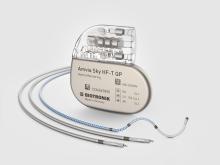“I did not let it throw me off course”
How a CLS Pacemaker Helps Cabaret Artist Wolfgang Koch Live Life to the Fullest

As an avid performer, Wolfgang Koch experienced true stage fright when he collapsed after a performance resulting in him needing a pacemaker. The reason, as it turned out later, was a previously undetected cardiac arrhythmia, whereby his heartbeat is greatly slowed down. Further medical examinations revealed that Koch suffered from chronotropic incompetence, a disease of the sinus node that prevents the heart rate from increasing adequately during exercise.
Now, 20 years later, Wolfgang Koch looks back calmly on the event: "Today, I feel so lucky that my little friend in my chest is making sure that I’m so healthy and can lead a normal life," he says with a smile.
His cardiologist Dr. Volker Leonhardt who has been by his side for the past 20 years also plays an important part in this. In addition to regular check-ups, Dr. Leonhardt and his team at the Telemedicine Center in Berlin continuously keep an eye on Wolfgang Koch’s heart and implant condition using BIOTRONIK Home Monitoring®. “The fact that somebody is checking my medical data gives me a great sense of security,” Wolfgang Koch adds.

Today, I feel so lucky that my little friend in my chest is making sure that I’m so healthy and can lead a normal life. The fact that somebody is checking my medical data gives me a great sense of security.
"Wolfgang Koch was always an enthusiastic and cheerful artist," comments his cardiologist Dr. Volker Leonhardt. “Everyone is exposed to physically and emotionally stressful situations in the course of their lives. For people with chronotropic incompetence, however, the heart cannot respond adequately to these stimuli. For performing artists like Wolfgang Koch, who experience the frequent and energizing occurrence of stage fright, this can be a great loss. For this reason, we decided to implant a special cardiac pacemaker with the option of closed loop stimulation (CLS for short). The CLS function makes use of neurological information in a unique way, making it possible to physiologically adapt the heart rate to the patient’s individual requirements. This means that Mr. Koch's pacemaker stimulation is not only adapted to physical stress, but also to mental stress, e.g. when he is on stage or watching an exciting film in the cinema," explains Dr. Leonhardt.
Dr. Songül Secer, head of telemedicine Deutsche Telemed and senior cardiologist Asklepios, treats many patients just like Wolfgang. According to her, roughly 4.5 million people need a pacemaker or a defibrillator in Europe. In Germany, around 300,000 people rely on it. Dr. Secer is an expert in telemedicine and appreciates the advancement we have seen in remote care in the past decades. “With Home Monitoring it doesn’t matter where the patient is – whether they’re in the US, Australia or Asia, they can be certain that a doctor is checking on them. In case of an emergency, we can call the closest hospital and provide the doctors with the patient’s vital data. This way we can save precious time and make sure that the correct treatment is provided.”










